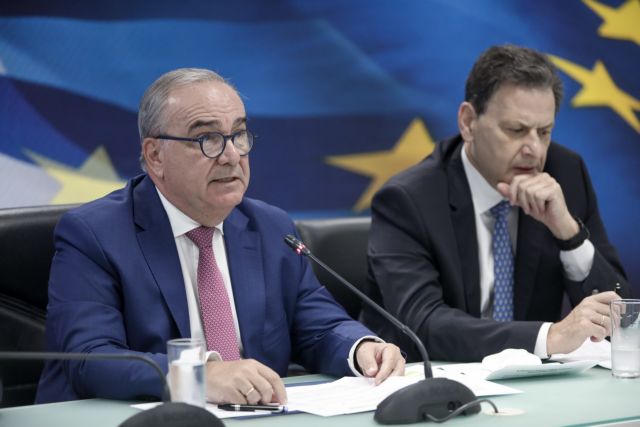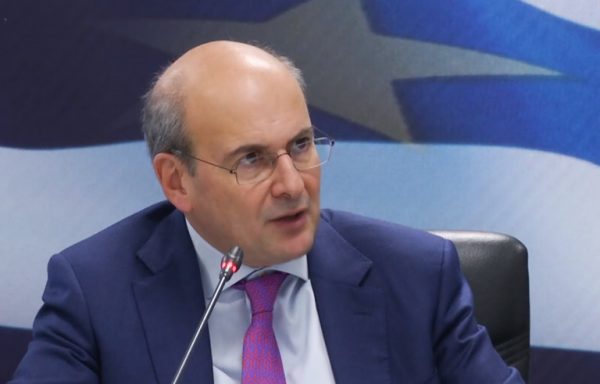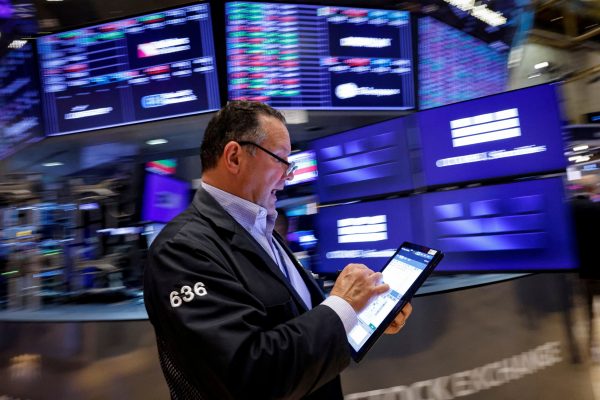
The Deputy Ministers of Finance, Theodoros Skylakakis and Development, Nikos Papathanasis, are urging entrepreneurs to avail themselves of the loans of the National Recovery and Sustainability Plan “Greece 2.0” as soon as possible.
The two ministers said that we are entering a period of increased interest rates, meaning that loans from the National Recovery and Sustainability Plan “Greece 2.0” have added significance and the speed with which companies will respond to this tool is of great importance.
The platform that supports the electronic submission of investment plans for loan financing is active (https://rrf-gobeyond.gr/welcome). In fact, more than 600 investment plans are already under development, of which 20 have been officially submitted.
Loans provided, today, by the credit institutions that are cooperating with the Recovery and Resilience Fund (RRF), have an interest rate of 0.35%. This rate will hold until the first 1.6 billion euros, which was borrowed at a very low interest rate from the Commission, are exhausted. When these are exhausted an interest rate hike will be enforced, which may be reasonable in a first phase and much higher in a second phase.
To get a sense of next phase interest rates, Germany, which borrowed at -0.40% about a year ago, is now at 1.7% and France, which is close to the rate at which the Commission borrows, is at 2.2-2.3% in the current phase.
Even the banks that have received an installment from the RRF, do not guarantee that they will lend at an interest rate of 0.35%.
There are three interest rates that matter:
- The interest rate of RRF which is at 0.35% and will increase over time
- The reference rate of the European Commission
- Determined on the basis of EU Communication no. 2008 / C 14/02.
- The reference interest rate consists of the basic interest rate increased by the margins of the above announcement, depending on the rating of the company concerned and the collateral provided.
So reference rate = key interest rate + loan margin
- The basic interest rate is based on the annual IBOR interest rate. Can be searched at the link:
Latest News

First Step Towards New Audiovisual Industry Hub in Drama
The project is set to contribute to the further development of Greece’s film industry and establish Drama as an audiovisual hub in the region

Airbnb Greece – Initial CoS Ruling Deems Tax Circular Unlawful
The case reached the Council of State following annulment applications filed by the Panhellenic Federation of Property Owners (POMIDA)

Mitsotakis Unveils €1 Billion Plan for Housing, Pensioners, Public investments
Greek Prime Minister Kyriakos Mitsotakis has announced a new set of economic support measures, worth 1 billion euros, aiming to provide financial relief to citizens.

Alter Ego Ventures Invests in Pioneering Gaming Company ‘Couch Heroes’
Alter Ego Ventures' participation in the share capital of Couch Heroes marks yet another investment by the Alter Ego Media Group in innovative companies with a focus on technology.

Corruption Still Plagues Greece’s Driving Tests
While traffic accidents continue to claim lives on Greek roads daily, irregularities and under-the-table dealings in the training and testing of new drivers remain disturbingly widespread

Pope Francis Died of Stroke and Heart Failure Vatican Confirms
As news of the official cause of death spread, tributes poured in from across the globe. The 1.4 billion-member Catholic Church is united in grief, remembering a pope who championed inclusion, justice, and compassion

Increase in Both Museum Visits, Revenues for 2024
As expected, the Acropolis was the top archeological site in the country, followed by Sounion, Mycenae, the ancient theater of Epidaurus, and Vergina in northern Greece

Where Greece’s Tourists Come From: A Look at 2025’s Top Visitor Markets
The United Kingdom continues to hold the top spot as the largest source of incoming tourism, with 5.6 million seats booked for Greece this summer — up 2.2% from last year. This accounts for 20% of all international air traffic to Greece

Pope Francis: A Pontiff Who Reshaped the Papacy and Sparked a Global Conversation
His first words from the balcony of St. Peter’s Basilica—“Brothers and sisters, good evening”—set the tone for a pontificate that would challenge norms, favor mercy over dogma, and bring the papacy closer to the people.

When Blue Skies was Unmasked as ND’s Political ‘Slush Fund’
The fact that so many top New Democracy (ND) party cadres were paid by the firm Blue Skies, owned by Thomas Varvitsiotis and Yiannis Olympios, without ever citing this publicly, raises very serious moral issues, regardless of the legality











![Πλημμύρες: Σημειώθηκαν σε επίπεδα ρεκόρ στην Ευρώπη το 2024 [γράφημα]](https://www.ot.gr/wp-content/uploads/2025/04/FLOOD_HUNGRY-90x90.jpg)




![Ξενοδοχεία: Μεγάλο το ενδιαφέρον για επενδύσεις στην Ελλάδα – Η θέση της Αθήνας [γραφήματα]](https://www.ot.gr/wp-content/uploads/2025/03/Athens-hotels-90x90.jpg)
























 Αριθμός Πιστοποίησης
Αριθμός Πιστοποίησης